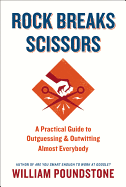
William Poundstone (Are You Smart Enough to Work at Google?) describes outguessing others as "easy, fun, and often profitable" in this handbook for "mind reading for real life." His methods are based on two main ideas: "random" selections that humans make typically fall into certain patterns and our perceptions of randomness can be easily skewed (unless we increase our awareness of these patterns). As an example, he points to the playground game from which the book's title is derived. Cultural predilections will often lead males to throw "rock" in the first round, so if you're up against a man, throw "paper." Very few average players will select the same object more than twice in a row, so if your opponent throws "rock" twice, they likely won't do it a third time, in which case you can throw "scissors" and either win (they throw "paper") or tie (they throw "scissors").
Many of Poundstone's chapters follow a similar line of thinking. You can increase your odds of winning a bigger portion of a lottery prize by playing numbers that are statistically shown to be played less frequently. A good student of eye movements can tell by watching your pupils whether you pulled a card your hand needs in a high-stakes card game.
Poundstone offers some more classically practical tips as well. He devotes a chapter to creating a difficult-to-crack password; in another, he discusses sniffing out a Ponzi scheme. Despite the hyperbole about mind-reading and heavy deep number-crunching in the financial chapters, Poundstone provides a sound blueprint for seeing the patterns in everyday life. --Matthew Tiffany, LCPC, writer for Condalmo and psychotherapist

